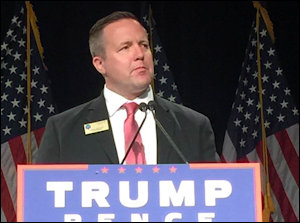
Corey Stewart
Data centers account for 92% of all new capital investment in Prince William County between 2012 and 2017. Now Corey Stewart, chairman of the Board of Supervisors and Republican candidate for the U.S. Senate, wants to raise taxes on them.
Stewart, who is running as a Donald Trump-style populist, proposes to use the $21 million in additional taxes to slash the county’s real estate tax rate. It’s about time, he says, that data centers pay their fair share of taxes, reports Inside Nova.
“The big data center companies in Prince William County are some of the largest, wealthiest corporations in the world,” Stewart said. “And I think people are concerned about data centers because these are big, ugly buildings that employ very few people, push up the cost of commercial land and drive the need for even more transmission lines in the county. We’re giving them a tax break, and that’s not right.”
Data centers used for cloud storage constitute one of the biggest bright spots in Virginia’s economic development efforts as the state struggles to diversify its economy from overreliance on the federal government. Loudoun and Prince William Counties have benefited from their proximity to the surfeit of high-capacity fiber-optic cable in Northern Virginia to attract billions of dollars in data-center investment. Other localities such as Virginia Beach and Henrico County have begun competing for the business by reducing tax rates on computers and peripherals. Even with the lower rates, data centers yield enough in local tax revenues that localities regard them as huge positives for the tax base.
In Prince William, the electricity-hungry data centers have become embroiled in a related issue of how to supply them with electric power. In a bitterly contested case, Dominion Energy has been trying to get approval to build a transmissions line through western Prince William County not only to serve a growing population but to deliver power to an Amazon Web Service data center in the Haymarket area.
According to Inside NoVa, Stewart argues that a higher tax won’t make existing data centers leave. The owners have already spent so much money to build the facilities and install the servers and other equipment that they would not shut them down.
Needless to say, the Northern Virginia Technology Council (NVTC) and its business allies oppose the tax, noting that raising the tariff will discourage future investment by cloud providers. Josh Levi, NVTC’s vice president for policy, says that some data centers fall into the category of “colocation centers” where the owner rents out server space to smaller businesses. If Prince William raised its tax rate, these colocation centers would have to pass on the new cost to their customers and potentially scare away some away. “It’s about dollars and cents, not emotions, for these companies,” Levi said.
Stewart responds that even with the tax increase, Prince William’s computer equipment rate still would be lower than that of Loudoun County, which has seen no diminution of interest by data centers. Cloud providers, he says, are still “pounding on their door.”
It will be interesting to see how Stewart’s tax-hike proposal plays out in the Republican senatorial nominating contest. Traditionally, Republicans could be counted on to take a pro-business, anti-tax stance. But Stewart is inveighing against a group of companies that are taking a beating in the public perception, especially among political conservatives.
Facebook has been roundly criticized from the left for being insufficiently vigilant in protecting the privacy of its users from misuse by Cambridge Analytica, an English data mining company affiliated with conservative figures and the Trump campaign. But conservatives have retorted that Facebook shared far more user data with the Obama campaign. A populist wave building within conservative media contends that Facebook, Google, Twitter and other West Coast tech giants, increasingly politically correct, are suppressing conservative voices on social media. Likewise, President Trump has singled out Amazon for allegedly not paying its fair share of sales taxes. If the revolt against the tech giants continues to build, then Stewart’s tax gambit could play very well in the Republican base.
Bacon’s bottom line: The Democratic Party and the Republican Party both represent coalitions of diverse groups and interests. Increasingly, the Democrats appear to be divided between the leftist “Bernie bro” faction and the establishment Hillary faction. Similarly, Republicans are divided between a populist Trump-loving faction and an establishment faction repelled by Trump’s careless, populist rhetoric.
Those divides are reflected in Virginia politics. Virginia Democrats faced a choice between the establishment candidate Ralph Northam and the Bernie-bro candidate, Tom Perriello in the nomination for governor last year. Having won both the nomination and the election, Northam appears to be in a position to keep the party unified… at least for now. While Republicans also selected an establishment candidate to run for governor, Ed Gillespie, he lost handily, creating a big opening for a Trump-style populist like Stewart. While I question his policy proposal to increase taxes on data centers, I suspect that Stewart’s gambit might be good politics — good enough, at least, to win the nomination.
As the dominant political parties schism, I can’t help but think there is an opportunity for a fiscally conservative, market-oriented, socially moderate and racially/ethnically inclusive party like the Libertarians. Libertarians have yet to identify a demographic constituency upon which to build a political base. But if they find just one leader who can crack that nut, politics in Virginia and the nation are ready to crystallize into a very different form.


